外研版八年级英语上册教案 Module 11 Way of life Unit 1(表格式教案)
文档属性
| 名称 | 外研版八年级英语上册教案 Module 11 Way of life Unit 1(表格式教案) |
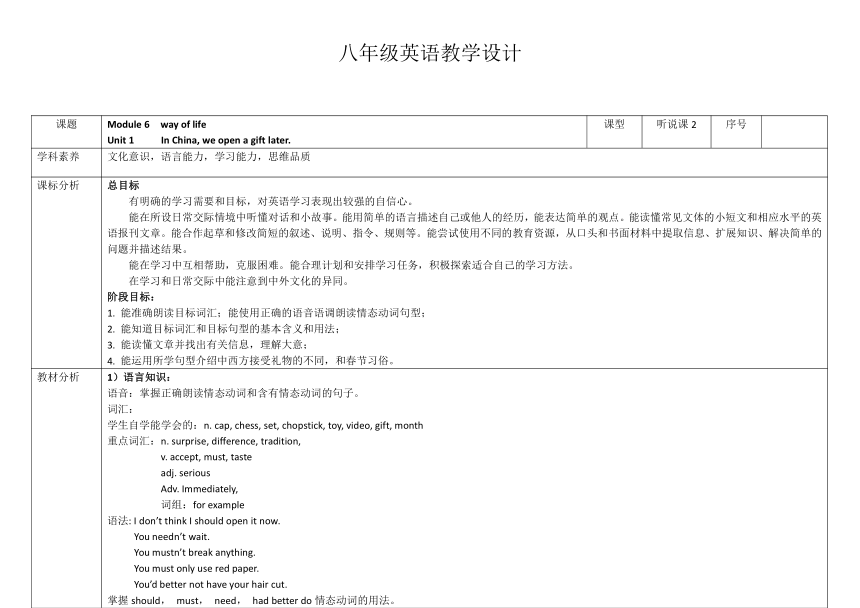
|
|
| 格式 | doc | ||
| 文件大小 | 72.5KB | ||
| 资源类型 | 教案 | ||
| 版本资源 | 外研版 | ||
| 科目 | 英语 | ||
| 更新时间 | 2022-08-03 00:00:00 | ||
图片预览

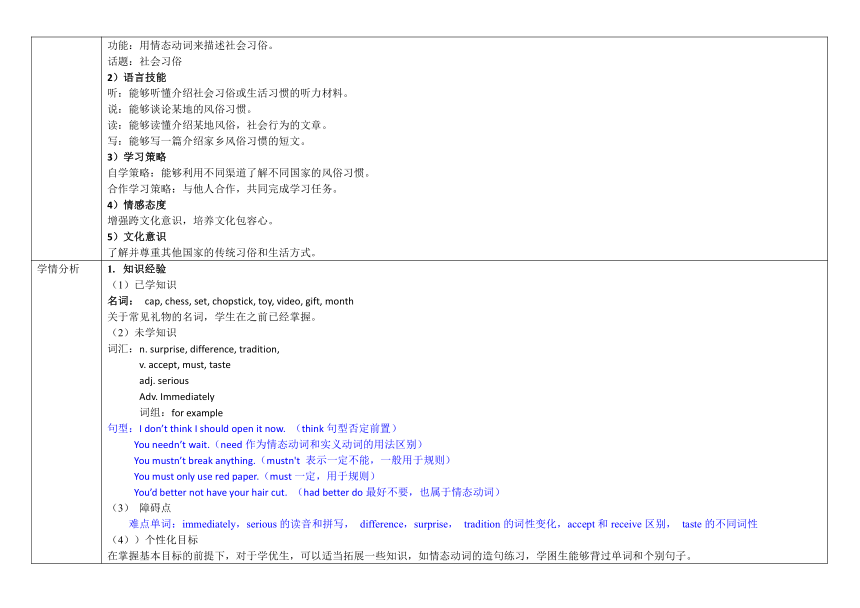
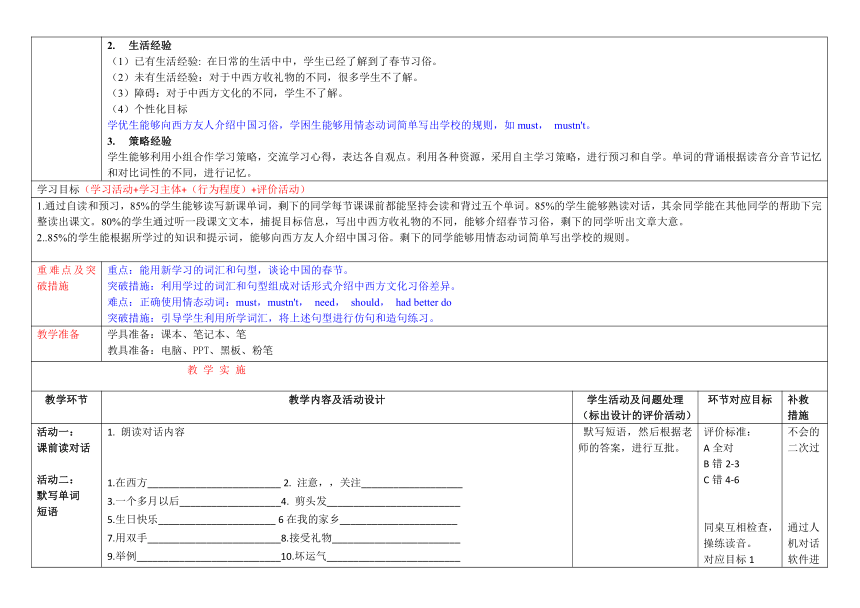
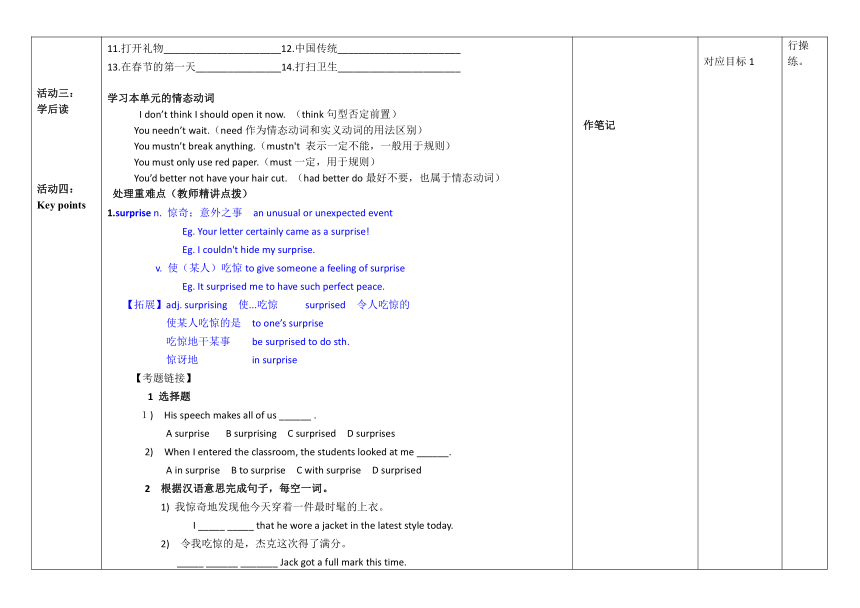
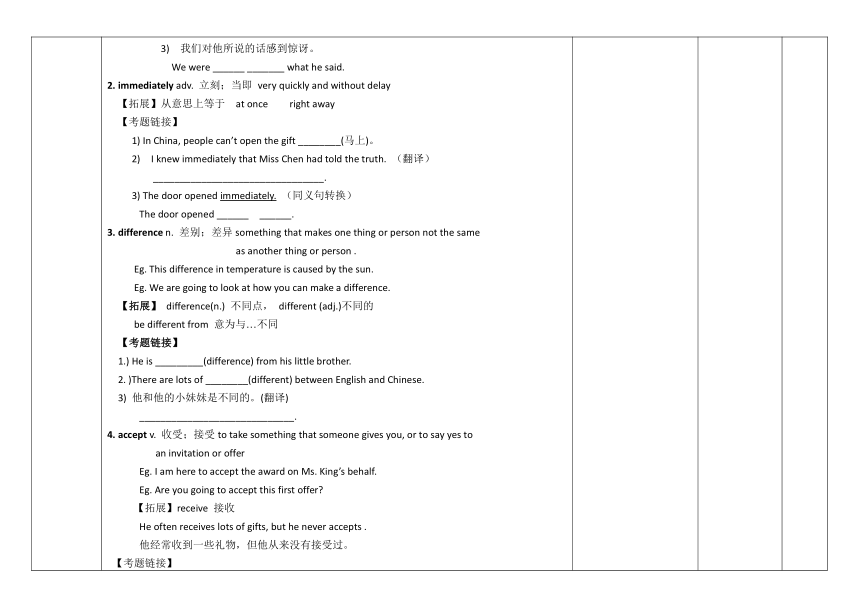
文档简介
八年级英语教学设计
课题 Module 6 way of lifeUnit 1 In China, we open a gift later. 课型 听说课2 序号
学科素养 文化意识,语言能力,学习能力,思维品质
课标分析 总目标有明确的学习需要和目标,对英语学习表现出较强的自信心。能在所设日常交际情境中听懂对话和小故事。能用简单的语言描述自己或他人的经历,能表达简单的观点。能读懂常见文体的小短文和相应水平的英语报刊文章。能合作起草和修改简短的叙述、说明、指令、规则等。能尝试使用不同的教育资源,从口头和书面材料中提取信息、扩展知识、解决简单的问题并描述结果。能在学习中互相帮助,克服困难。能合理计划和安排学习任务,积极探索适合自己的学习方法。在学习和日常交际中能注意到中外文化的异同。阶段目标:能准确朗读目标词汇;能使用正确的语音语调朗读情态动词句型;能知道目标词汇和目标句型的基本含义和用法;能读懂文章并找出有关信息,理解大意;能运用所学句型介绍中西方接受礼物的不同,和春节习俗。
教材分析 1)语言知识:语音:掌握正确朗读情态动词和含有情态动词的句子。词汇:学生自学能学会的:n. cap, chess, set, chopstick, toy, video, gift, month重点词汇:n. surprise, difference, tradition, v. accept, must, taste adj. serious Adv. Immediately, 词组:for example语法: I don’t think I should open it now. You needn’t wait. You mustn’t break anything. You must only use red paper. You’d better not have your hair cut.掌握should, must, need, had better do情态动词的用法。功能:用情态动词来描述社会习俗。话题:社会习俗语言技能听:能够听懂介绍社会习俗或生活习惯的听力材料。说:能够谈论某地的风俗习惯。读:能够读懂介绍某地风俗,社会行为的文章。写:能够写一篇介绍家乡风俗习惯的短文。学习策略自学策略:能够利用不同渠道了解不同国家的风俗习惯。合作学习策略:与他人合作,共同完成学习任务。情感态度增强跨文化意识,培养文化包容心。文化意识了解并尊重其他国家的传统习俗和生活方式。
学情分析 知识经验已学知识名词: cap, chess, set, chopstick, toy, video, gift, month关于常见礼物的名词,学生在之前已经掌握。未学知识词汇:n. surprise, difference, tradition, v. accept, must, taste adj. serious Adv. Immediately 词组:for example句型:I don’t think I should open it now. (think句型否定前置) You needn’t wait.(need作为情态动词和实义动词的用法区别) You mustn’t break anything.(mustn't 表示一定不能,一般用于规则) You must only use red paper.(must一定,用于规则) You’d better not have your hair cut. (had better do最好不要,也属于情态动词)(3) 障碍点难点单词:immediately,serious的读音和拼写, difference,surprise, tradition的词性变化,accept和receive区别, taste的不同词性(4))个性化目标在掌握基本目标的前提下,对于学优生,可以适当拓展一些知识,如情态动词的造句练习,学困生能够背过单词和个别句子。生活经验已有生活经验: 在日常的生活中中,学生已经了解到了春节习俗。未有生活经验:对于中西方收礼物的不同,很多学生不了解。障碍:对于中西方文化的不同,学生不了解。个性化目标学优生能够向西方友人介绍中国习俗,学困生能够用情态动词简单写出学校的规则,如must, mustn't。策略经验学生能够利用小组合作学习策略,交流学习心得,表达各自观点。利用各种资源,采用自主学习策略,进行预习和自学。单词的背诵根据读音分音节记忆和对比词性的不同,进行记忆。
学习目标(学习活动+学习主体+(行为程度)+评价活动)
1.通过自读和预习,85%的学生能够读写新课单词,剩下的同学每节课课前都能坚持会读和背过五个单词。85%的学生能够熟读对话,其余同学能在其他同学的帮助下完整读出课文。80%的学生通过听一段课文文本,捕捉目标信息,写出中西方收礼物的不同,能够介绍春节习俗,剩下的同学听出文章大意。2..85%的学生能根据所学过的知识和提示词,能够向西方友人介绍中国习俗。剩下的同学能够用情态动词简单写出学校的规则。
重难点及突破措施 重点:能用新学习的词汇和句型,谈论中国的春节。突破措施:利用学过的词汇和句型组成对话形式介绍中西方文化习俗差异。难点:正确使用情态动词:must,mustn't, need, should, had better do突破措施:引导学生利用所学词汇,将上述句型进行仿句和造句练习。
教学准备 学具准备:课本、笔记本、笔教具准备:电脑、PPT、黑板、粉笔
教 学 实 施
教学环节 教学内容及活动设计 学生活动及问题处理(标出设计的评价活动) 环节对应目标 补救措施
活动一:课前读对话活动二:默写单词短语活动三:学后读活动四:Key points 朗读对话内容1.在西方_________________________ 2. 注意,,关注___________________3.一个多月以后___________________4. 剪头发_________________________5.生日快乐______________________ 6在我的家乡______________________7.用双手_________________________8.接受礼物________________________9.举例___________________________10.坏运气_________________________11.打开礼物______________________12.中国传统_______________________13.在春节的第一天________________14.打扫卫生_______________________学习本单元的情态动词I don’t think I should open it now. (think句型否定前置) You needn’t wait.(need作为情态动词和实义动词的用法区别) You mustn’t break anything.(mustn't 表示一定不能,一般用于规则) You must only use red paper.(must一定,用于规则) You’d better not have your hair cut. (had better do最好不要,也属于情态动词)处理重难点(教师精讲点拨)1.surprise n. 惊奇;意外之事 an unusual or unexpected event Eg. Your letter certainly came as a surprise! Eg. I couldn't hide my surprise. v. 使(某人)吃惊to give someone a feeling of surprise Eg. It surprised me to have such perfect peace. 【拓展】adj. surprising 使...吃惊 surprised 令人吃惊的 使某人吃惊的是 to one’s surprise 吃惊地干某事 be surprised to do sth. 惊讶地 in surprise【考题链接】 1 选择题 1) His speech makes all of us ______ . A surprise B surprising C surprised D surprises 2) When I entered the classroom, the students looked at me ______. A in surprise B to surprise C with surprise D surprised 2 根据汉语意思完成句子,每空一词。 1) 我惊奇地发现他今天穿着一件最时髦的上衣。 I _____ _____ that he wore a jacket in the latest style today. 2) 令我吃惊的是,杰克这次得了满分。 _____ ______ _______ Jack got a full mark this time. 3) 我们对他所说的话感到惊讶。 We were ______ _______ what he said. 2. immediately adv. 立刻;当即 very quickly and without delay 【拓展】从意思上等于 at once right away 【考题链接】1) In China, people can’t open the gift ________(马上)。2) I knew immediately that Miss Chen had told the truth. (翻译) ________________________________.3) The door opened immediately. (同义句转换) The door opened ______ ______.3. difference n. 差别;差异something that makes one thing or person not the same as another thing or person . Eg. This difference in temperature is caused by the sun. Eg. We are going to look at how you can make a difference. 【拓展】 difference(n.) 不同点, different (adj.)不同的 be different from 意为与…不同 【考题链接】 1.) He is _________(difference) from his little brother. 2. )There are lots of ________(different) between English and Chinese. 3) 他和他的小妹妹是不同的。(翻译) _____________________________.4. accept v. 收受;接受to take something that someone gives you, or to say yes to an invitation or offer Eg. I am here to accept the award on Ms. King’s behalf. Eg. Are you going to accept this first offer 【拓展】receive 接收 He often receives lots of gifts, but he never accepts . 他经常收到一些礼物,但他从来没有接受过。 【考题链接】 1) In China, people often ________(接受)gifts with two hands. They offered me a job in the supermarket, and I accepted. (译) ______________________________________________. 2) 不要接受陌生人的东西。 ____________________________________.4.tradition n. 传统习俗 a very old custom, belief, or story It was a tradition of the ancient world. The story is based mainly on tradition. Parents bring up their children in accordance with their own traditions. 【拓展】adj. traditional 传统的 【考题链接】 1) The _______(tradition) in China are very different from those in America. 2) Spring Festival is a ______(tradition) festival. Everyone loves it very much. 5. taste v. 有……的味道 to have a particular flavour The food was dry and didn't taste very good. 【拓展】 n. 味道;滋味 The taste was very nice, like chocolate and oranges and hot sweet coffee,and very soon Alice finished the bottle. 【考题链接】 1) I tried that egg, it ________(taste) very good. I decided to eat another one. 2) 我和同桌都喜欢听京剧,我们有相同的品味。 _________________________________________________.6. serious adj. 认真严肃的;不开玩笑的 meaning what you say or do, and not making a joke Bob's face is very serious. Bob 的脸色很严肃。 Do you think Mike is serious about going to live in New Zealand 你认为Mike 对于去新西兰一事是认真的吗? 【拓展】adv. seriously 严肃地 【考题链接】 1) 我的老师总是很严肃,并且特别严格。 _______________________________________ 2) He threw that bag _________(serious), and said nothing. 3) He is very serious.(划线部分提问) _______ is he ________ II重点句型1. Here is your gift ( http: / / www.21cnjy.com ). 这是你的礼物
这是一句由here引导的倒装句,即here+谓语+主语,此外there也有这样的用法。 Eg:There comes the bus.
注意:只有当主语是名词时才能够用倒装句,如果是代词则不能。 Eg:Here you are. 2. What a surprise! 真惊讶啊! 此句是感叹句式,用来表达赞美、惊叹、喜悦等感情。
主要结构如下: 1)what +(a\an)+adj.+n.(+主语+谓语)! Eg. What a beautiful girl she is! 2)How +adj.\adv. (+主语+谓语)! Eg.How beautiful the girl is! 3. You needn’t wait. ( http: / / www.21cnjy.com )你不必等了。
need在这里用作情态动词,表示“需要”, 其后用动词原形, 常用于否定句、疑问句及 must引导的一般疑问句的否定回答。
Eg:1) You needn’t come to school this afternoon.
2) ---Must I finish my homework today ---No, you needn’t. 【拓展】need作实义动词时,其后可接to ( http: / / www.21cnjy.com ) do或doing sth表示“需要做某事”. 1) 当句子主语是人时,用need to do sth。 Eg:I need to take some exercise every morning. 2) 当句子主语是物时,用need doing sth Eg:Our classroom needs cleaning everyday. 4. do some cleaning 意为:__________ Eg: do some washing\cooking\shopping You should help your mother do some cleaning after school. 5. had better ( http: / / www.21cnjy.com ) (not) do sth 最好(不) 做某事
Eg. We had better take an umbrella. / You’d better not go out in the evening.
【拓展】you’d better not have your hair cut during the Spring Festival month. 你最好不要在正月里剪头发。 you’d better do sth. 最好做某事 you’d better not do sth 最好不要做某事 You'd better make sure how much the sofa is. 你最好弄清楚那沙发到底多少钱。 You'd better not mention the matter when you talk with him. 和他谈话时,最好不要提这件事。 6.We usually don’t pay much attention to that.我们通常不太重视那个。 pay attention to 注意;专心;集中注意力。 同义表达:take care of, be careful e.g. I never seem to be able to pay attention to our teacher. 我似乎向来就没法去注意我们的老师。 We've got to take care of him. 我们说好要照顾他的。 His mother told him to be careful again and again. 他的妈妈一再告诉他要细心。 7.You can't be serious! 你不是认真的吧! serious在此处的意思是“认真的,不开玩的”。 e.g. ——The school has decided to give us another day's holiday. 我们学校决定再给我们一天的假期。 ——You can‘t be serious! 你在开玩笑吧! 默写短语,然后根据老师的答案,进行互批。作笔记 评价标准:A全对B错2-3C错4-6同桌互相检查,操练读音。对应目标1对应目标1 不会的二次过通过人机对话软件进行操练。
活动五:随堂测 根据汉语意思完成英语句子,每空一词(含缩略形式)。1. 昨天,爸爸给我买了一副国际象棋。My father bought ________ ________ ________ for me yesterday.2. 大部分孩子喜欢玩电子游戏。Most children like to play ________ ________.3. 我们学校有很多校规。例如,禁止在图书馆吃东西。There are many school rules in our school. _______ _______, you mustn’t eat in the library.4. 你今天来看我,真是个惊喜!You came to see me today. _______ ________ ________!5. 在中国,大年初一不能大扫除。You ______ _______ _______ ________ on the first day of the Spring Festival in China.6. 在课堂上你应该多注意老师。You should ________ ________ ________ ________ the teacher in class.7. 我不是在开玩笑。我是认真的。 I’m not joking. I ________ ________.8. 你最好不要这个时间喝咖啡。You ________ ________ ________ ________ coffee at this time.根据句意从括号内选择恰当的词填空。1. My uncle ________ (may; can) be in the office. I’m not sure.2. It’s very late. You ________ (might; must) go to bed now.3. There isn’t any food in the fridge. We ________ (need; may) buy some.4. In China, we ________ (needn’t; can’t) drive a car at the age of 1. 完成加速背诵本节课重点句子。
活动六:作业 巩固性作业:1.E听说,继续跟读课文10分钟,纠正自己的发音,模仿语音语调,注意重读的规律及其所传达的信息。2.背重点句子。拓展性作业:完成相应模块的针对性阅读。
板书设计 I don’t think I should open it now. You needn’t wait. You mustn’t break anything. You must only use red paper. You’d better not have your hair cut.
教学反思 通过自读和预习,读写新课单词,剩下的同学每节课课前都能坚持会读和背过五个单词。学生能够熟读对话,其余同学能在其他同学的帮助下完整读出课文。学生通过听一段课文文本,捕捉目标信息,写出中西方收礼物的不同,能够介绍春节习俗,剩下的同学听出文章大意。学生能根据所学过的知识和提示词,能够向西方友人介绍中国习俗。剩下的同学能够用情态动词简单写出学校的规则。
课题 Module 6 way of lifeUnit 1 In China, we open a gift later. 课型 听说课2 序号
学科素养 文化意识,语言能力,学习能力,思维品质
课标分析 总目标有明确的学习需要和目标,对英语学习表现出较强的自信心。能在所设日常交际情境中听懂对话和小故事。能用简单的语言描述自己或他人的经历,能表达简单的观点。能读懂常见文体的小短文和相应水平的英语报刊文章。能合作起草和修改简短的叙述、说明、指令、规则等。能尝试使用不同的教育资源,从口头和书面材料中提取信息、扩展知识、解决简单的问题并描述结果。能在学习中互相帮助,克服困难。能合理计划和安排学习任务,积极探索适合自己的学习方法。在学习和日常交际中能注意到中外文化的异同。阶段目标:能准确朗读目标词汇;能使用正确的语音语调朗读情态动词句型;能知道目标词汇和目标句型的基本含义和用法;能读懂文章并找出有关信息,理解大意;能运用所学句型介绍中西方接受礼物的不同,和春节习俗。
教材分析 1)语言知识:语音:掌握正确朗读情态动词和含有情态动词的句子。词汇:学生自学能学会的:n. cap, chess, set, chopstick, toy, video, gift, month重点词汇:n. surprise, difference, tradition, v. accept, must, taste adj. serious Adv. Immediately, 词组:for example语法: I don’t think I should open it now. You needn’t wait. You mustn’t break anything. You must only use red paper. You’d better not have your hair cut.掌握should, must, need, had better do情态动词的用法。功能:用情态动词来描述社会习俗。话题:社会习俗语言技能听:能够听懂介绍社会习俗或生活习惯的听力材料。说:能够谈论某地的风俗习惯。读:能够读懂介绍某地风俗,社会行为的文章。写:能够写一篇介绍家乡风俗习惯的短文。学习策略自学策略:能够利用不同渠道了解不同国家的风俗习惯。合作学习策略:与他人合作,共同完成学习任务。情感态度增强跨文化意识,培养文化包容心。文化意识了解并尊重其他国家的传统习俗和生活方式。
学情分析 知识经验已学知识名词: cap, chess, set, chopstick, toy, video, gift, month关于常见礼物的名词,学生在之前已经掌握。未学知识词汇:n. surprise, difference, tradition, v. accept, must, taste adj. serious Adv. Immediately 词组:for example句型:I don’t think I should open it now. (think句型否定前置) You needn’t wait.(need作为情态动词和实义动词的用法区别) You mustn’t break anything.(mustn't 表示一定不能,一般用于规则) You must only use red paper.(must一定,用于规则) You’d better not have your hair cut. (had better do最好不要,也属于情态动词)(3) 障碍点难点单词:immediately,serious的读音和拼写, difference,surprise, tradition的词性变化,accept和receive区别, taste的不同词性(4))个性化目标在掌握基本目标的前提下,对于学优生,可以适当拓展一些知识,如情态动词的造句练习,学困生能够背过单词和个别句子。生活经验已有生活经验: 在日常的生活中中,学生已经了解到了春节习俗。未有生活经验:对于中西方收礼物的不同,很多学生不了解。障碍:对于中西方文化的不同,学生不了解。个性化目标学优生能够向西方友人介绍中国习俗,学困生能够用情态动词简单写出学校的规则,如must, mustn't。策略经验学生能够利用小组合作学习策略,交流学习心得,表达各自观点。利用各种资源,采用自主学习策略,进行预习和自学。单词的背诵根据读音分音节记忆和对比词性的不同,进行记忆。
学习目标(学习活动+学习主体+(行为程度)+评价活动)
1.通过自读和预习,85%的学生能够读写新课单词,剩下的同学每节课课前都能坚持会读和背过五个单词。85%的学生能够熟读对话,其余同学能在其他同学的帮助下完整读出课文。80%的学生通过听一段课文文本,捕捉目标信息,写出中西方收礼物的不同,能够介绍春节习俗,剩下的同学听出文章大意。2..85%的学生能根据所学过的知识和提示词,能够向西方友人介绍中国习俗。剩下的同学能够用情态动词简单写出学校的规则。
重难点及突破措施 重点:能用新学习的词汇和句型,谈论中国的春节。突破措施:利用学过的词汇和句型组成对话形式介绍中西方文化习俗差异。难点:正确使用情态动词:must,mustn't, need, should, had better do突破措施:引导学生利用所学词汇,将上述句型进行仿句和造句练习。
教学准备 学具准备:课本、笔记本、笔教具准备:电脑、PPT、黑板、粉笔
教 学 实 施
教学环节 教学内容及活动设计 学生活动及问题处理(标出设计的评价活动) 环节对应目标 补救措施
活动一:课前读对话活动二:默写单词短语活动三:学后读活动四:Key points 朗读对话内容1.在西方_________________________ 2. 注意,,关注___________________3.一个多月以后___________________4. 剪头发_________________________5.生日快乐______________________ 6在我的家乡______________________7.用双手_________________________8.接受礼物________________________9.举例___________________________10.坏运气_________________________11.打开礼物______________________12.中国传统_______________________13.在春节的第一天________________14.打扫卫生_______________________学习本单元的情态动词I don’t think I should open it now. (think句型否定前置) You needn’t wait.(need作为情态动词和实义动词的用法区别) You mustn’t break anything.(mustn't 表示一定不能,一般用于规则) You must only use red paper.(must一定,用于规则) You’d better not have your hair cut. (had better do最好不要,也属于情态动词)处理重难点(教师精讲点拨)1.surprise n. 惊奇;意外之事 an unusual or unexpected event Eg. Your letter certainly came as a surprise! Eg. I couldn't hide my surprise. v. 使(某人)吃惊to give someone a feeling of surprise Eg. It surprised me to have such perfect peace. 【拓展】adj. surprising 使...吃惊 surprised 令人吃惊的 使某人吃惊的是 to one’s surprise 吃惊地干某事 be surprised to do sth. 惊讶地 in surprise【考题链接】 1 选择题 1) His speech makes all of us ______ . A surprise B surprising C surprised D surprises 2) When I entered the classroom, the students looked at me ______. A in surprise B to surprise C with surprise D surprised 2 根据汉语意思完成句子,每空一词。 1) 我惊奇地发现他今天穿着一件最时髦的上衣。 I _____ _____ that he wore a jacket in the latest style today. 2) 令我吃惊的是,杰克这次得了满分。 _____ ______ _______ Jack got a full mark this time. 3) 我们对他所说的话感到惊讶。 We were ______ _______ what he said. 2. immediately adv. 立刻;当即 very quickly and without delay 【拓展】从意思上等于 at once right away 【考题链接】1) In China, people can’t open the gift ________(马上)。2) I knew immediately that Miss Chen had told the truth. (翻译) ________________________________.3) The door opened immediately. (同义句转换) The door opened ______ ______.3. difference n. 差别;差异something that makes one thing or person not the same as another thing or person . Eg. This difference in temperature is caused by the sun. Eg. We are going to look at how you can make a difference. 【拓展】 difference(n.) 不同点, different (adj.)不同的 be different from 意为与…不同 【考题链接】 1.) He is _________(difference) from his little brother. 2. )There are lots of ________(different) between English and Chinese. 3) 他和他的小妹妹是不同的。(翻译) _____________________________.4. accept v. 收受;接受to take something that someone gives you, or to say yes to an invitation or offer Eg. I am here to accept the award on Ms. King’s behalf. Eg. Are you going to accept this first offer 【拓展】receive 接收 He often receives lots of gifts, but he never accepts . 他经常收到一些礼物,但他从来没有接受过。 【考题链接】 1) In China, people often ________(接受)gifts with two hands. They offered me a job in the supermarket, and I accepted. (译) ______________________________________________. 2) 不要接受陌生人的东西。 ____________________________________.4.tradition n. 传统习俗 a very old custom, belief, or story It was a tradition of the ancient world. The story is based mainly on tradition. Parents bring up their children in accordance with their own traditions. 【拓展】adj. traditional 传统的 【考题链接】 1) The _______(tradition) in China are very different from those in America. 2) Spring Festival is a ______(tradition) festival. Everyone loves it very much. 5. taste v. 有……的味道 to have a particular flavour The food was dry and didn't taste very good. 【拓展】 n. 味道;滋味 The taste was very nice, like chocolate and oranges and hot sweet coffee,and very soon Alice finished the bottle. 【考题链接】 1) I tried that egg, it ________(taste) very good. I decided to eat another one. 2) 我和同桌都喜欢听京剧,我们有相同的品味。 _________________________________________________.6. serious adj. 认真严肃的;不开玩笑的 meaning what you say or do, and not making a joke Bob's face is very serious. Bob 的脸色很严肃。 Do you think Mike is serious about going to live in New Zealand 你认为Mike 对于去新西兰一事是认真的吗? 【拓展】adv. seriously 严肃地 【考题链接】 1) 我的老师总是很严肃,并且特别严格。 _______________________________________ 2) He threw that bag _________(serious), and said nothing. 3) He is very serious.(划线部分提问) _______ is he ________ II重点句型1. Here is your gift ( http: / / www.21cnjy.com ). 这是你的礼物
这是一句由here引导的倒装句,即here+谓语+主语,此外there也有这样的用法。 Eg:There comes the bus.
注意:只有当主语是名词时才能够用倒装句,如果是代词则不能。 Eg:Here you are. 2. What a surprise! 真惊讶啊! 此句是感叹句式,用来表达赞美、惊叹、喜悦等感情。
主要结构如下: 1)what +(a\an)+adj.+n.(+主语+谓语)! Eg. What a beautiful girl she is! 2)How +adj.\adv. (+主语+谓语)! Eg.How beautiful the girl is! 3. You needn’t wait. ( http: / / www.21cnjy.com )你不必等了。
need在这里用作情态动词,表示“需要”, 其后用动词原形, 常用于否定句、疑问句及 must引导的一般疑问句的否定回答。
Eg:1) You needn’t come to school this afternoon.
2) ---Must I finish my homework today ---No, you needn’t. 【拓展】need作实义动词时,其后可接to ( http: / / www.21cnjy.com ) do或doing sth表示“需要做某事”. 1) 当句子主语是人时,用need to do sth。 Eg:I need to take some exercise every morning. 2) 当句子主语是物时,用need doing sth Eg:Our classroom needs cleaning everyday. 4. do some cleaning 意为:__________ Eg: do some washing\cooking\shopping You should help your mother do some cleaning after school. 5. had better ( http: / / www.21cnjy.com ) (not) do sth 最好(不) 做某事
Eg. We had better take an umbrella. / You’d better not go out in the evening.
【拓展】you’d better not have your hair cut during the Spring Festival month. 你最好不要在正月里剪头发。 you’d better do sth. 最好做某事 you’d better not do sth 最好不要做某事 You'd better make sure how much the sofa is. 你最好弄清楚那沙发到底多少钱。 You'd better not mention the matter when you talk with him. 和他谈话时,最好不要提这件事。 6.We usually don’t pay much attention to that.我们通常不太重视那个。 pay attention to 注意;专心;集中注意力。 同义表达:take care of, be careful e.g. I never seem to be able to pay attention to our teacher. 我似乎向来就没法去注意我们的老师。 We've got to take care of him. 我们说好要照顾他的。 His mother told him to be careful again and again. 他的妈妈一再告诉他要细心。 7.You can't be serious! 你不是认真的吧! serious在此处的意思是“认真的,不开玩的”。 e.g. ——The school has decided to give us another day's holiday. 我们学校决定再给我们一天的假期。 ——You can‘t be serious! 你在开玩笑吧! 默写短语,然后根据老师的答案,进行互批。作笔记 评价标准:A全对B错2-3C错4-6同桌互相检查,操练读音。对应目标1对应目标1 不会的二次过通过人机对话软件进行操练。
活动五:随堂测 根据汉语意思完成英语句子,每空一词(含缩略形式)。1. 昨天,爸爸给我买了一副国际象棋。My father bought ________ ________ ________ for me yesterday.2. 大部分孩子喜欢玩电子游戏。Most children like to play ________ ________.3. 我们学校有很多校规。例如,禁止在图书馆吃东西。There are many school rules in our school. _______ _______, you mustn’t eat in the library.4. 你今天来看我,真是个惊喜!You came to see me today. _______ ________ ________!5. 在中国,大年初一不能大扫除。You ______ _______ _______ ________ on the first day of the Spring Festival in China.6. 在课堂上你应该多注意老师。You should ________ ________ ________ ________ the teacher in class.7. 我不是在开玩笑。我是认真的。 I’m not joking. I ________ ________.8. 你最好不要这个时间喝咖啡。You ________ ________ ________ ________ coffee at this time.根据句意从括号内选择恰当的词填空。1. My uncle ________ (may; can) be in the office. I’m not sure.2. It’s very late. You ________ (might; must) go to bed now.3. There isn’t any food in the fridge. We ________ (need; may) buy some.4. In China, we ________ (needn’t; can’t) drive a car at the age of 1. 完成加速背诵本节课重点句子。
活动六:作业 巩固性作业:1.E听说,继续跟读课文10分钟,纠正自己的发音,模仿语音语调,注意重读的规律及其所传达的信息。2.背重点句子。拓展性作业:完成相应模块的针对性阅读。
板书设计 I don’t think I should open it now. You needn’t wait. You mustn’t break anything. You must only use red paper. You’d better not have your hair cut.
教学反思 通过自读和预习,读写新课单词,剩下的同学每节课课前都能坚持会读和背过五个单词。学生能够熟读对话,其余同学能在其他同学的帮助下完整读出课文。学生通过听一段课文文本,捕捉目标信息,写出中西方收礼物的不同,能够介绍春节习俗,剩下的同学听出文章大意。学生能根据所学过的知识和提示词,能够向西方友人介绍中国习俗。剩下的同学能够用情态动词简单写出学校的规则。
同课章节目录
- Module 1 How to learn English
- Unit 1 Let's try to speak English as much as possi
- Unit 2 You should smile at her.
- Unit 3 Language in use .
- Module 2 My home town and my country
- Unit 1 It's taller than many other buildings.
- Unit 2 Cambridge is a beautiful city in the east o
- Unit 3 Language in use .
- Module 3 Sports.
- Unit 1 Nothing is more exciting than playing tenni
- Unit 2 This year we training more carefully.
- Unit 3 Language in use .
- Module 4 Planes, ships and trains .
- Unit 1 He lives the farthest from school.
- Unit 2 What is the best way to travel.
- Unit 3 Language in use .
- Module 5 Lao She Teahouse.
- Unit 1 I wanted to see the Beijing Opera.
- Unit 2 It descibes the changes in Chinese society.
- Unit 3 Language in use .
- Module 6 Animals in danger.
- Unit 1 It allows people to get closer to them .
- Unit 2 The WWF is working hard to save them all.
- Unit 3 Language in use .
- Revision module A
- Module 7 A famous story
- Unit 1 Alice was sitting with her sister by the ri
- Unit 2 She was thinking about her cat.
- Unit 3 Language in use .
- Module 8 Accidents
- Unit 1 While the car were changing to red, a car s
- Unit 2 I was trying to pick it up when it bite me
- Unit 3 Language in use .
- Module 9 Population
- Unit 1 The population of China is about 1.37 billi
- Unit 2 Arnwick was a city with 200,000 people.
- Unit 3 Language in use .
- Module 10 The weathe
- Unit 1 It might snow.
- Unit 2 The weather is fine all year round.
- Unit 3 Language in use .
- Module 11 Way of life
- Unit 1 In China ,we open a gift later.
- Unit 2 In England, you usually drink tea with milk
- Unit 3 Language in use .
- Module 12 Help
- Unit 1 What should we do before help arrives?
- Unit 2 Stay away from windows and heavy furniture.
- Unit 3 Language in use .
- Revision module B
